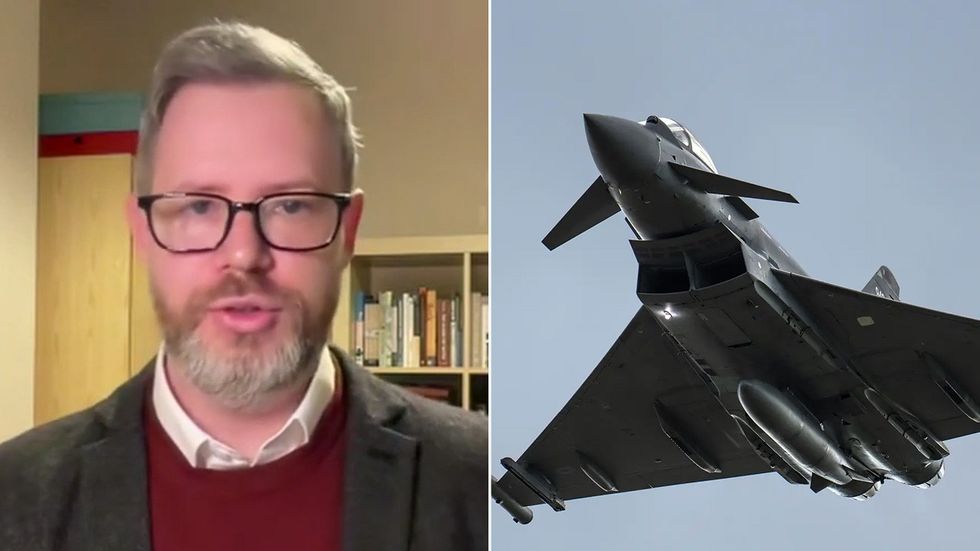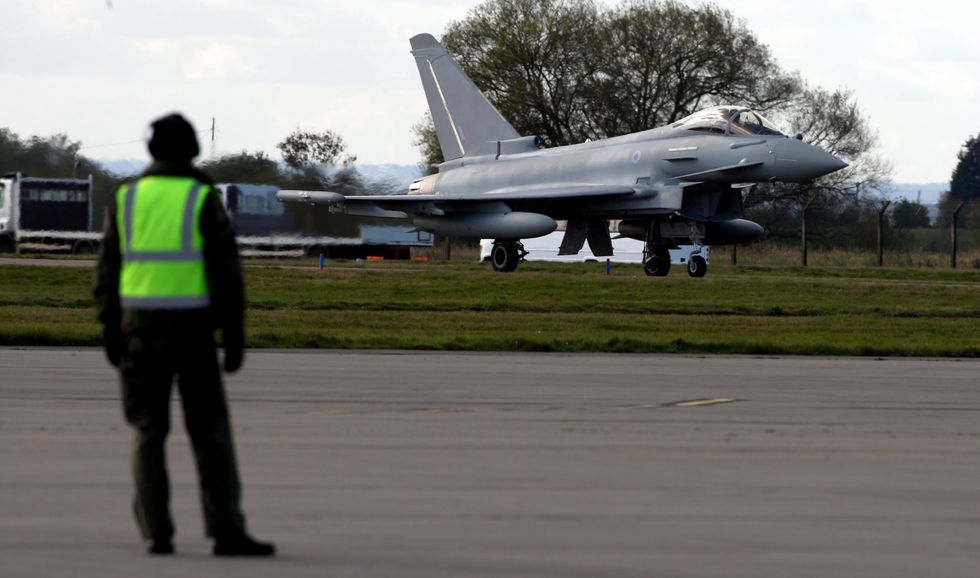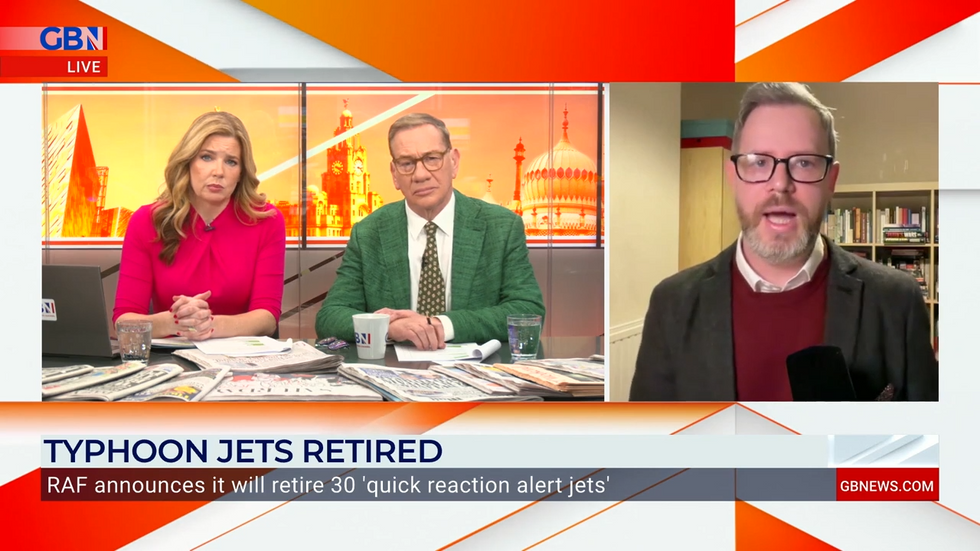The Royal Air Force has been blasted by a military historian and defence analyst after deciding to cut 30 jets from their arsenal.
The quick reaction alert Tranche 1 Typhoons are currently used to protect British skies from potential attacks.
The jets will be grounded despite completing only just 40 per cent of their predicted flying hours, in a move that has been likened to "scrapping Spitfires before the Battle of Britain".
As part of the retirement plan, the fleet of jets will decrease from 137 to 107. The first jets will start being withdrawn from service five years ahead of the original date of 2030.

Sparking concern for the British defence efforts against Russia in the war against Ukraine, former defence minister Mark Francois condemned the move.
He told The Daily Mail: "Can you imagine if we had sold off squadrons of Spitfires prior to the Battle of Britain? There would have been uproar.
"The Tranche 1 Typhoons should be mothballed to enable them to be brought back at a time of conflict. For the purpose of defending Britain's skies from Russian jets, they will do splendidly."
Discussing the retirement on GB News, host Michael Portillo argued that the aircraft are "still highly capable" and shouldn't be removed, especially at a time where there are "heightened tensions" and "the need to defend the country".

Defence analyst Chris Newton explained to GB News: "The MoD's argument is that they're going to cost to maintain and they don't have the kind of equipment and the software of the later Tranche 2 and 3 aircraft, and therefore to keep them is going to be expensive.
"The £300million needed to spend on maintaining Tranche 1 could be used on Tranches 2 and 3 instead."
LATEST DEVELOPMENTS:
- RAF sparks fury as it retires 30 'quick reaction alert' Typhoon jets: 'Like scrapping Spitfires before the Battle of Britain!'
- HMS Prince of Wales will NOT be sold to raise cash for defence spending, says Navy
- Britain sends 1,500 troops to Poland amid largest Nato exercise since Cold War following Trump's comments
Michael then argued: "That sounds very rational, but don't you think it's a PR disaster? Is this not going to cause outrage?
"Is it not a mixed message from the Government, on the one hand telling us that we're in a security crisis, and on the other hand to be retiring capable aircraft?"
Newton agreed, admitting: "I agree that instead of disposing and stripping of them, these aircraft should be put into storage and should be held and reserved in time for a conflict. I agree these aircraft should be kept."
Discussing the war in Russia, Newton warned that the retirement of 30 jets is sending the "wrong message" about Britain's defence capabilities.

Newton claimed: "We've seen in terms of the war in Ukraine how important numbers are, technology is important, and if we were in the war against Russia or a major conventional war, we will need a reserve.
"We will need our full structures and resilience built into them. In that sense, we need that. It does send the wrong message with regard to Russia and our willingness.
"If we can't spend this money on an operational reserve, it doesn't send a good message to Russia, about our resolve and our willingness to deter major conflict."
from GB News https://ift.tt/3ldP9GO
The Royal Air Force has been blasted by a military historian and defence analyst after deciding to cut 30 jets from their arsenal.
The quick reaction alert Tranche 1 Typhoons are currently used to protect British skies from potential attacks.
The jets will be grounded despite completing only just 40 per cent of their predicted flying hours, in a move that has been likened to "scrapping Spitfires before the Battle of Britain".
As part of the retirement plan, the fleet of jets will decrease from 137 to 107. The first jets will start being withdrawn from service five years ahead of the original date of 2030.

Sparking concern for the British defence efforts against Russia in the war against Ukraine, former defence minister Mark Francois condemned the move.
He told The Daily Mail: "Can you imagine if we had sold off squadrons of Spitfires prior to the Battle of Britain? There would have been uproar.
"The Tranche 1 Typhoons should be mothballed to enable them to be brought back at a time of conflict. For the purpose of defending Britain's skies from Russian jets, they will do splendidly."
Discussing the retirement on GB News, host Michael Portillo argued that the aircraft are "still highly capable" and shouldn't be removed, especially at a time where there are "heightened tensions" and "the need to defend the country".

Defence analyst Chris Newton explained to GB News: "The MoD's argument is that they're going to cost to maintain and they don't have the kind of equipment and the software of the later Tranche 2 and 3 aircraft, and therefore to keep them is going to be expensive.
"The £300million needed to spend on maintaining Tranche 1 could be used on Tranches 2 and 3 instead."
LATEST DEVELOPMENTS:
- RAF sparks fury as it retires 30 'quick reaction alert' Typhoon jets: 'Like scrapping Spitfires before the Battle of Britain!'
- HMS Prince of Wales will NOT be sold to raise cash for defence spending, says Navy
- Britain sends 1,500 troops to Poland amid largest Nato exercise since Cold War following Trump's comments
Michael then argued: "That sounds very rational, but don't you think it's a PR disaster? Is this not going to cause outrage?
"Is it not a mixed message from the Government, on the one hand telling us that we're in a security crisis, and on the other hand to be retiring capable aircraft?"
Newton agreed, admitting: "I agree that instead of disposing and stripping of them, these aircraft should be put into storage and should be held and reserved in time for a conflict. I agree these aircraft should be kept."
Discussing the war in Russia, Newton warned that the retirement of 30 jets is sending the "wrong message" about Britain's defence capabilities.

Newton claimed: "We've seen in terms of the war in Ukraine how important numbers are, technology is important, and if we were in the war against Russia or a major conventional war, we will need a reserve.
"We will need our full structures and resilience built into them. In that sense, we need that. It does send the wrong message with regard to Russia and our willingness.
"If we can't spend this money on an operational reserve, it doesn't send a good message to Russia, about our resolve and our willingness to deter major conflict."



0 Comments
Don't share any link